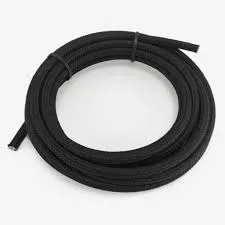Dez . 04, 2024 03:13 Back to list
Durable Stainless Steel Wire for High-Performance Metal Hose Applications
Stainless Steel Wire in Metal Hoses An Overview
Stainless steel wire plays a crucial role in the production of metal hoses, a versatile and durable solution used in various industrial applications. These hoses are essential components in sectors such as automotive, aerospace, chemical processing, and food and beverage, due to their ability to withstand high temperatures and pressures along with their resistance to corrosion. This article explores the significance of stainless steel wire in metal hoses, highlighting its properties, benefits, and applications.
What is Stainless Steel Wire?
Stainless steel wire is a high-performance material made from alloys primarily composed of iron, chromium, and nickel. The addition of chromium leads to the formation of a passive layer of chromium oxide on the surface, which protects the underlying metal from corrosion. Depending on the specific type of stainless steel used—such as 304, 316, or 321—the wire can exhibit varying degrees of resistance to oxidation, heat, and chemical exposure.
The Role of Stainless Steel Wire in Metal Hoses
Metal hoses are typically constructed using multiple strands of stainless steel wire, woven together to form a flexible yet robust conduit. This design allows for the effective transfer of fluids, gases, and other materials while maintaining integrity under dynamic conditions. One of the standout features of stainless steel wire in hose construction is its adaptability; it can be engineered to meet specific pressure and temperature requirements, enhancing the overall performance of the metal hose.
Properties of Stainless Steel Wire
1. Corrosion Resistance One of the most significant advantages of stainless steel wire is its exceptional corrosion resistance. This property is vital for metal hoses that operate in environments exposed to moisture, chemicals, or extreme temperatures.
2. Strength and Durability Stainless steel wire is renowned for its high tensile strength, making it capable of withstanding significant pressure without deformation. This is particularly important in industries where the safety and integrity of the system are paramount.
3. Flexibility Despite its strength, stainless steel wire can be engineered for flexibility. This flexibility allows metal hoses to bend and twist without compromising their structural integrity, providing ease of installation in complex systems.
stainless steel wire of metal hose

4. Temperature Resistance Stainless steel wire maintains its strength and performance in high-temperature applications, making it suitable for industries like aerospace or petrochemical, where extreme conditions are commonplace.
Applications of Stainless Steel Wire Metal Hoses
The applications of stainless steel wire in metal hoses are diverse
- Chemical Processing In plants where hazardous substances are transported, stainless steel metal hoses provide a safe and reliable means to move chemicals without risk of leakage or reaction.
- Automotive In the automotive industry, metal hoses made from stainless steel wire are used for fuel lines, exhaust systems, and cooling systems, where heat and pressure management are critical.
- Food and Beverage The hygienic properties of stainless steel make it a preferred choice in food and beverage applications, where cleanliness and purity are essential.
- Oil and Gas In the oil and gas sector, these metal hoses facilitate the transportation of crude oil and natural gas, proving their resilience in harsh environments.
Conclusion
Stainless steel wire is integral to the construction of metal hoses, providing unrivaled strength, flexibility, and resistance to corrosion. The benefits offered by stainless steel wire enhance the performance and reliability of metal hoses across various industries, ensuring safe and efficient operations. As industries evolve and demand more robust solutions, the importance of stainless steel wire in metal hose design will continue to grow, solidifying its position as a vital component in modern engineering applications.
-
High-Quality OEM/Custom PTFE/Teflon Hose Factory in China
NewsJun.01,2025
-
Low Pressure Flexible Hydraulic Hose Durable & Affordable Steel Braid
NewsJun.01,2025
-
1 Inch ID Rubber Hose High-Pressure & Chemical Resistant
NewsMay.31,2025
-
High-Pressure 1/4" Hydraulic Hose Lines R5 Rubber, Durable & Flexible
NewsMay.31,2025
-
1SN Hydraulic Hose High Pressure, Steel Wire Braid Durability
NewsMay.31,2025
-
Smooth Cover Hydraulic Hose Supplier OEM Export Solutions
NewsMay.31,2025
